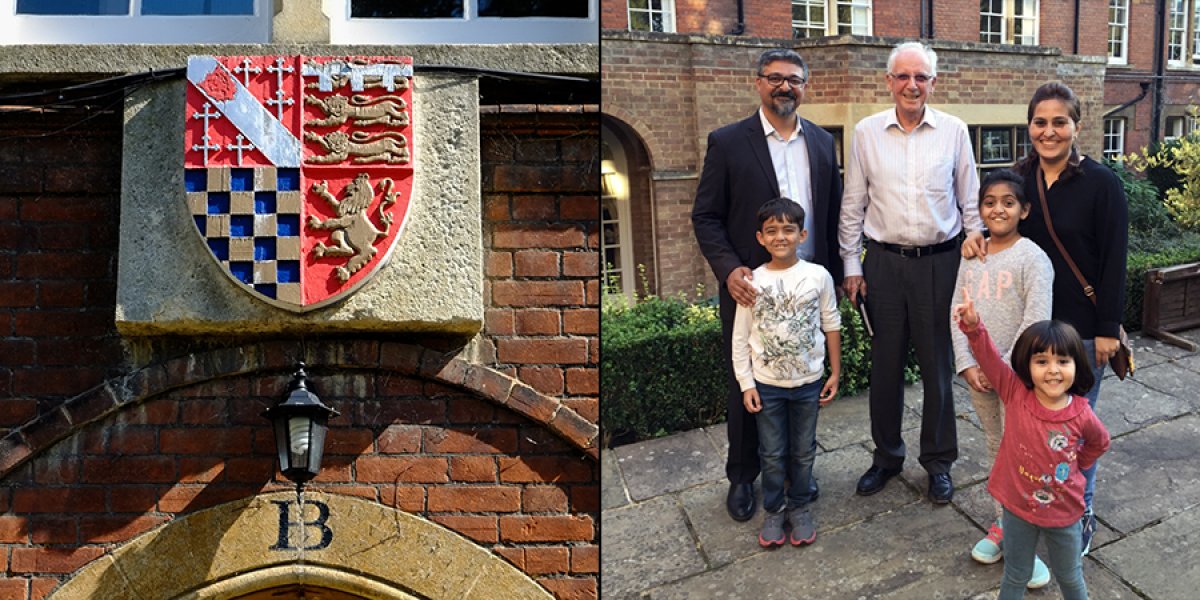Values for life: the impact of my Cambridge experience - Shehzad Jeeva
Shehzad Jeeva (St Edmund’s 2001) shares the values he learnt at Cambridge and how they continue to play a key role in his life and work today.
Coming to Cambridge marked the first time that I had lived outside Pakistan, not to mention alone. At the time I was elated about the fact that I would not only be commencing my studies in the field I was most passionate about, but that I was able to do so at one of the finest institutions in the world.
The path to Cambridge
I first realised my zeal for Organic Chemistry as a Grade 12 student, viewing it as a lens through which I could comprehend the complexities of life. I resolved to pursue the subject up to doctorate level, and began working towards making that dream a reality. Coming from a humble background in Karachi, my education up till then had seen me attend both a public sector sixth form college, as well as a public university – thus, being admitted to Cambridge felt as though the pieces from a puzzle in my life were beginning to come together.
My studies at Cambridge were funded by three distinct scholarships: an external scholarship from the Aga Khan Foundation, the Cambridge Trust’s Commonwealth Scholarship for PhD students, and the Lundgren Research Award.
Life at Cambridge
One person that was tremendously influential throughout my life at Cambridge, and still remains a trusted friend and mentor, was Sir Robert Brian Heap, who was, at the time, Master of my College, St Edmund’s. I vividly recall the first time I met him and the then Vice-Master, Rev Dr Geoffrey Cook, when I first came to Cambridge accompanied by my parents. I’ve never forgotten the care and concern with which Professor Heap enquired about my wellbeing, as well as the support he provided during my search for accommodation within College (thus ensuring I was never far from campus life).
I often say that the first lesson I learned at Cambridge was compassion for others, and I credit Professor Heap with playing an instrumental role in that lesson. Other individuals whom I would be remiss not to mention are the Fellows of St Edmunds College, especially Ann Kaminski, Su Metcalfe, Moira Gardener, and of course, my PhD supervisor, Stephen Moratti – their careful, guided supervision helped me flourish at the institution and, in Dr Moratti’s case, helped produce a PhD thesis that earned the Toby Jackman prize, an accomplishment of which I remain very proud.
Holistic development
Cambridge provided me with an environment where I learnt how important it was to appreciate the existence of different cultures, languages, and beliefs – not necessarily for the sake of emulating them, but acknowledging and respecting our mutual coexistence. This was underscored by the diversity of nationalities represented at St Edmund’s.
My work in the Chemistry Department was conducted in a state-of-the-art laboratory, giving me access to facilities and equipment that I would never have had in Pakistan. I actively took part in college life through sporting and music events, such as joining the rowing team (we won two Blades in the Lent and May Bumps!), as a member of the Squash team, as captain of the Cricket team, and as a flautist in various concerts – the latter two activities were particularly meaningful, as they helped me to act as an ambassador for South Asian culture at Cambridge. Formal dinners at the College also served as important networking opportunities, through which I was able to build friendships which last to this day.
Values I carry with me
Cambridge instilled values in me which I have carried ever since. Besides compassion and a deep reverence for pluralism, I credit my sense of discipline, respect for hard work, and current leadership abilities, to my Cambridge experience.
Many people often ask me how leading a national examination board connects with my background as a scientist – my response has always been to tell them that the dedication I bring as director of the Aga Khan University Examination Board (AKU-EB) is because I am able to connect its demands with those that were required of me as a student.
Cambridge demonstrated how much of an impact this unique approach towards education and holistic development could have on a single individual – this is the type of transformative experience that I am able to share with thousands of students across Pakistan, who benefit from the quality education that AKU-EB brings to them.
Dr Shehzad Jeeva, currently the Director of Aga Khan University Examination Board, has been given additional charge and appointed as Chairman of the IBCC by the Ministry of Federal Education, Government of Pakistan. The IBCC is a very high-level strategic government body that provides a forum for the chief executives of public and private examination boards in the country, with the objective of achieving a fair measure of uniformity of academic evaluation and curricular standards in education.
Shehzad Jeeva has a PhD in Chemistry and attended St Edmund's College.
If you would like to submit your own alumni story, send us an email for details of our submission guidelines.
This article has been written by Shehzad Jeeva and the opinions expressed are those of the author.
